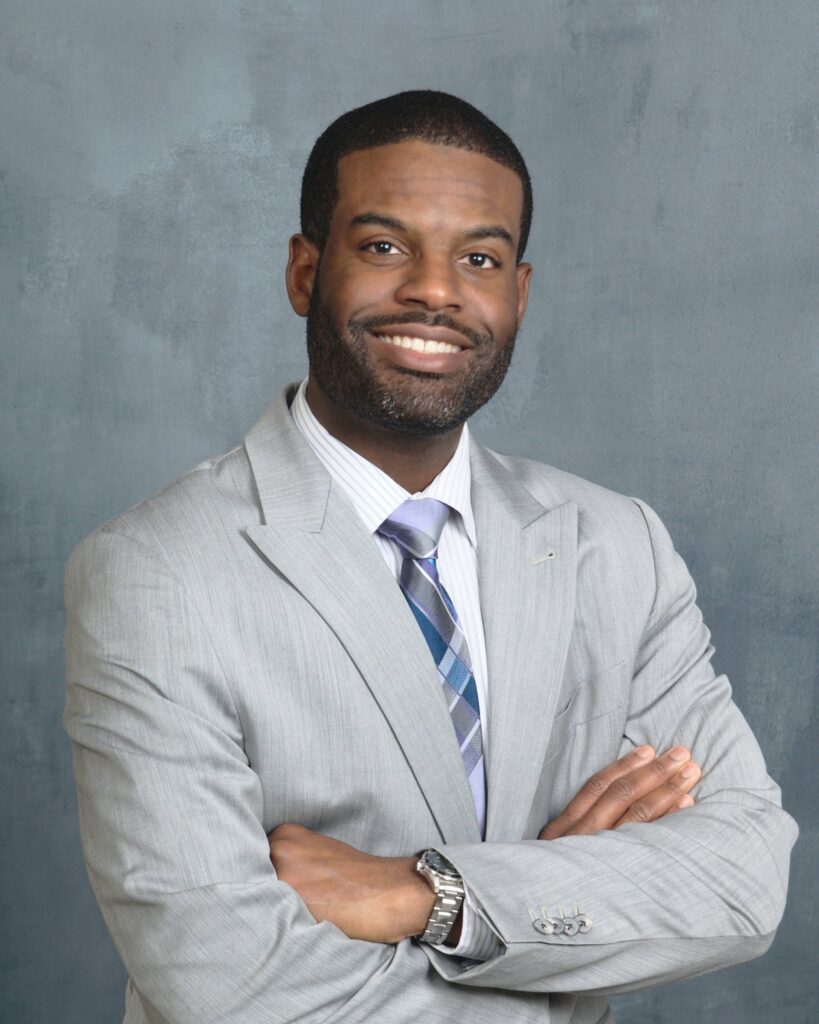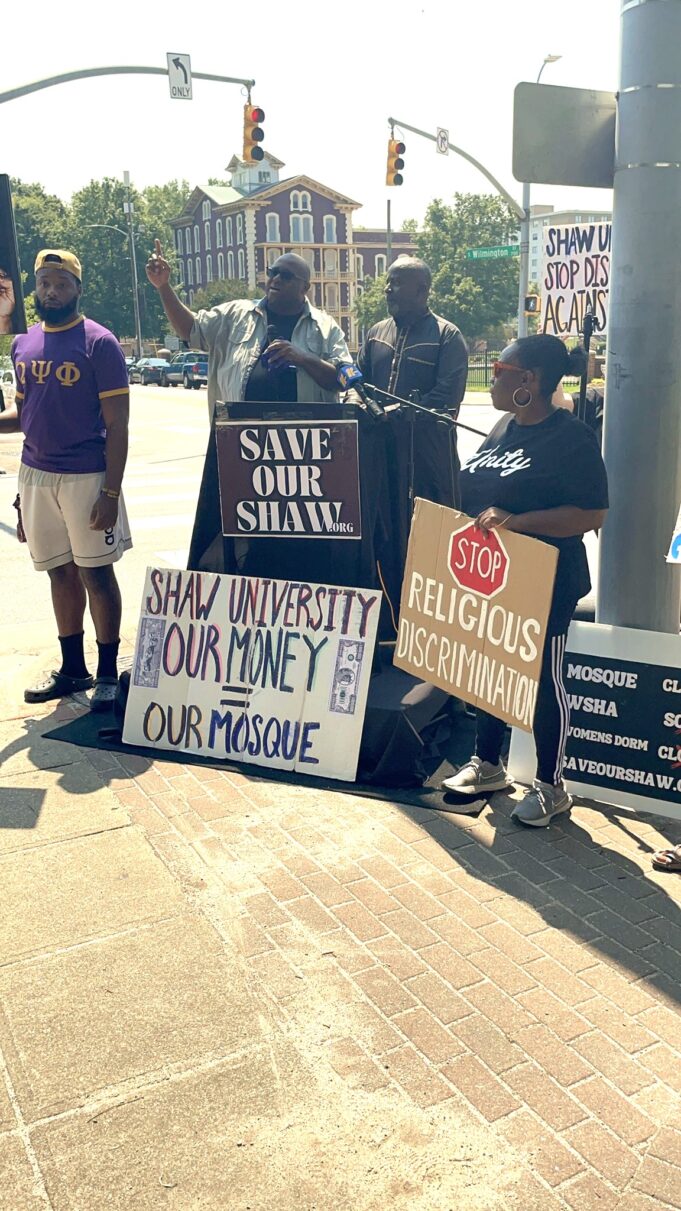Shaw University, located in Raleigh, N.C., is an HBCU (Historical Black College and University) and is the first one in North Carolina and in the Southern United States.
It also holds the distinction of being the only HBCU with a mosque that was built from the ground up thanks to the late King Khalid ibn Abdul-Aziz Al-Saud’s daughter. She donated
$1 million to Shaw University in 1981 for the establishment of an Islamic and International Studies Center, complete with a mosque, library, lecture halls, and offices. This renowned establishment is known as King Khalid Mosque.
However, the mosque has become Ibrahim’s sacrificial lamb for many in the local Muslim community. It has been closed for public services since the COVID-1- pandemic began in March 2020. There is some speculation the closure was connected to gentrification. According to the Triangle Business Journal, a meeting was held in November 2019 where officials and staff at Shaw collaborated with a team of experts from the Urban Land Institute to tackle the financial and operational challenges currently hindering the institution. The panel of experts advised the university to divest from non-essential real estate assets and utilize the resulting funds to support a comprehensive revitalization and sustainable growth plan.

Gentrification is the process of urban development that results in the displacement of lower-income residents, often leading to the migration of more affluent inhabitants to the area. Like many American cities, Raleigh has been grappling with the effects of gentrification for years, and it has become a significant concern for its residents. In Shaw University’s case, there might be a link between gentrification and the closure of King Khalid Mosque.
Nation of Islam Student Minister Amon Muhammad of Mosque No. 34 in Durham, N.C., located 30 minutes from Raleigh, told The Final Call, that “the Triangle” which encompasses the Raleigh and Durham areas, is experiencing a surge of gentrification.
“It is essential to recognize that the root of these problems, not just in the Triangle but in cities across the country, lies in spiritual and moral deficiencies. The value of a space should not be compromised solely for its material worth. Why would we jeopardize a spiritual center for a high-rise or other commercial developments in these tumultuous times?” he said.
“The mosque holds immense historical significance. In addition to that, the surrounding area is highly esteemed and advantageous to our community,” Student Minister Muhammad explained. The mosque is located at 130 Martin Luther King Blvd. which is a testament to its historical and cultural value, he added.

“Furthermore, Shaw and St. Augustine, which happen to be among the oldest HBCUs in existence, are located in Raleigh. It is disheartening to witness such disregard for what we consider important. Those who appreciate these values see this as a deliberate action to disrupt the area and displace its Black residents. Even in the residential part, Blacks are literally being priced out of their homes. You know, not moved out, priced out,” Student Minister Muhammad added.
The school is moving forward with its request before the city council to have its land rezoned.
“Shaw is facing financial hardship and hasn’t received the same philanthropic and government investments as many predominantly White institutions. A decline in student enrollment has furthered the financial hardship; the campus reported having 1,067 students in 2021, less than half its historical enrollment. The rezoning would give the school a path for new revenue, which would come from leasing land to developers to build towering new offices and apartments,” noted a June article on indyweek.com titled, “As Vote on Shaw Rezoning Looms, Growth of the HBCU Hangs in the Balance.”
CAIR (Council on American Islamic Relations), is at the forefront of the fight to keep the mosque open. It has issued press releases and advisories. In a March action alert, the organization stated that Shaw’s rezoning application is causing concern among the Muslim community and that the university is erasing the mosque to profit from the land developed.
This mosque has been an essential place of worship for Muslims in Raleigh for 40 years. While Shaw University has recently reopened other religious buildings, including the campus chapel, and resumed other religious activities, the mosque closed to the public for good.

“Rezoning the land would give the university the ability to sell the building that the mosque, which was built with a donation from the Muslim community and open to the public for decades before Shaw University closed it in 2020,” CAIR said in its most recent release.
In a brief interview with The Final Call, Ismail Allison, the National Communications Coordinator for CAIR, revealed that the zoning request in Raleigh has been officially approved by city leaders and referred The Final Call to Nigel Edwards, an attorney, and King Khalid Mosque board member.
The Final Call contacted Shaw University several times but received no response. At the beginning of this year, the university issued a statement that stated in part, “In response to recent protests, Shaw University respects the First Amendment rights of individuals to peaceably assemble and voice their concerns.
As previously announced, the International Studies Center on the campus of Shaw University is open and available for use to enrolled students; access to the mosque by Shaw students is coordinated through the University’s Chaplain office. In the wake of the pandemic, the campus mosque will only be available to currently enrolled Shaw University students, and the revised hours of operation for the center will be communicated directly to students.”
Mr. Edwards is a leading advocate for the preservation of the King Khalid Mosque. He told The Final Call that community protests started at the beginning of the year.
“We are deeply disappointed with the city council’s decision. Despite our efforts to foster positive relationships and engage in meaningful conversations with many council members, some did not acknowledge our communication or include us in the decision-making process. It is disheartening that Mayor Pro Temp Corey Branch claimed to have spoken with all sides but did not reach out to us,” he said.
Mr. Edwards emphasized that the battle is far from over. He said despite the city council’s decision, there had been some notable progress. “We are nearing the final stages of securing a memorandum of understanding, allowing us to re-enter the building temporarily. We plan to occupy the mosque’s location for the next few years. However, we will also be pursuing legal action against Shaw University during this time,” he said.
“They insisted that we sue them to clarify our rights to the property and theirs as well. Their confidence in a favorable court ruling makes them believe they can absolve themselves of any blame for the closure of the mosque.”













